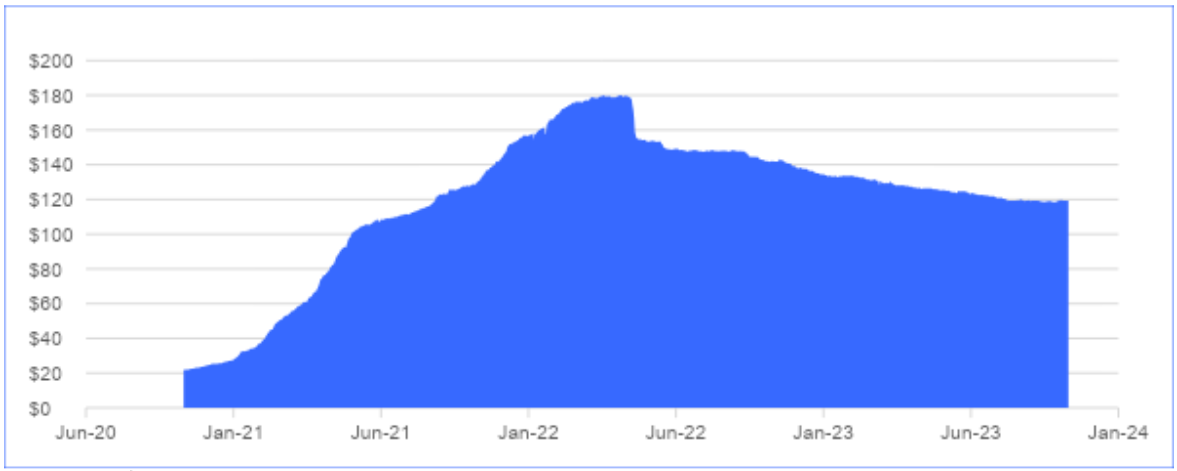David Alderman, Research Analyst at Franklin Templeton Digital Assets will be speaking at the upcoming Benzinga Future Of Digital Assets. Mark Nov. 14 on your calendar for the must-attend gathering in the industry!
In today's world, many have perceived crypto as having limited fundamental value and often being driven purely by speculation. While the speculative nature of crypto is undeniable, that speculation is built on a foundation of technology that is a significant leap forward in innovation. The innovation of crypto is best summed up as crypto reduces the cost of trust. In the traditional financial system, any transaction between two parties involves many trusted intermediaries; however, using crypto rails, there are significantly less parties involved in processing a transaction.

Source: Bank of America Global Research, Beyond Crypto: Tokenization (page 54)
The key to eliminating these trusted intermediaries involves sharing a ledger that can be trusted by all parties involved. Enter decentralization. Shared ledgers among different parties are not capable of being fully trusted without sufficient decentralization.
As intermediaries are eliminated from economic activity, substantial economic savings are realized for all remaining participants involved in the process. Less middlemen means less mouths to feed, and improved cost efficiencies. Additionally, the fewer involved parties inherently result in decreased counterparty risks.
In stark contrast, centralized systems, by their very definition, bear inherent weaknesses, such as single points of failure and centralized control. This makes them susceptible to various issues, including corruption, inefficiencies, and mismanagement. It's important to acknowledge these vulnerabilities when contrasting centralized systems with decentralized blockchain technology.
“The safest and most efficient intermediary is the one you don’t need.”
Omid Malekan, author of Re-Architecting Trust: The Curse of History and the Crypto Cure for Money, Markets, and Platforms
Tangible Examples
There are tangible examples in the real world where cryptocurrencies have found practical use. For instance, Bitcoin, often called "digital gold" because it acts as a sovereign bearer asset, eliminates the frictions of transacting across borders and reduces obstacles in the traditional financial system. Additionally, stablecoins, cryptocurrencies whose value are pegged to the price of other assets, have garnered attention as they have gained more and more adoption, with current total value locked (TVL) at ~US$120bn.

Source: Artemis
In a recent research report titled “The Relentless Rise of Stablecoins: An onchain analysis of USD-backed stablecoin activity” written by Peter Johnson, Co-Head of Venture Investments at Brevan Howard Digital, the success of stablecoins is hard to dispute:
“[Year to date], the number of weekly active addresses has grown ~35%, and there are currently ~5m addresses sending stablecoins each week.”
– Peter Johnson
While the current use cases of cryptocurrencies with widespread adoption remain somewhat limited, there is a promising array of early-stage projects that exhibit high potential. Several examples include projects in two different categories: (i) Tokenized Real-World Assets (RWAs) and (ii) Decentralized Physical Infrastructure Networks (DePIN).
Within Tokenized RWAs, the tokenization of treasuries has seen significant growth since the beginning of the year, reaching ~US$700m in TVL currently, according to a dashboard by rwa.xyz. The largest of these tokenized Treasury projects is the Franklin OnChain U.S. Government Money Fund (FOBXX), reaching greater than US$300m in assets under management (AUM). It is the first U.S.-registered mutual fund to use a public blockchain to process transactions and record share ownership. DePIN projects are slowly starting to gain traction on the demand side, such as with Hivemapper signing its first license deal for its mapping data.
Beyond Cost Of Trust Reduction
It's important to acknowledge that the fundamental value of crypto and blockchain technology stems from their ability to reduce the cost of trust, which, in turn, paves the way for a multitude of enhanced capabilities and advantages. Consequently, it doesn't merely add value but acts as a catalyst for a range of benefits, including the facilitation of micropayments and the establishment of open, permissionless financial systems that democratize access to and participation in the global economy.
Several potential benefits enabled by these open, permissionless systems include:
-
Global and borderless financial systems with near-instant settlement
-
Free and open global experimentation
-
Improved security through open-source networks
-
Transparency and immutability
-
Programmability of money & incentives
-
Minimization of human error
-
Financial sovereignty
All these potential benefits, among others, show how crypto and blockchain technology could lower the cost of trust and provides a material leap forward in innovation that shouldn’t be ignored.
Conclusion
As I prepare to discuss these topics and more at the Benzinga's Future of Digital Assets conference, I invite you to explore the limitless potential of blockchain and cryptocurrencies and how firms like Franklin Templeton are positioning themselves and their clients to capitalize on these trends. These technologies are not just disrupting the status quo; they are revolutionizing how we trust, transact, and interact in a digital world.
In conclusion, the genuine value of crypto and blockchain lies in their ability to reduce the cost of trust via eliminating trusted intermediaries and enabling a trust-minimizing system. This core benefit is further amplified by the additional capabilities and applications these technologies bring (micropayments, open permissionless systems, etc.). Digital gold and stablecoins are proven examples with current adoption and many more are coming, with the potential to dramatically reshape the way we transact and trust in today’s world.
Franklin Templeton Digital Assets
Endnote:
-
Source: RWA.xyz. “Tokenized treasuries.” November, 2023.
-
Source: Hivemapper. “Hivemapper Inc. is now licensing data for paying customers.” October 23, 2023.
Glossary:
-
Weekly active addresses: represents a rough proxy for the number of active global users, measured by transactions of a particular asset (in this case, stablecoins) across global blockchains over a week time period.
You could lose money by investing in the fund. Although the fund seeks to preserve the value of your investment at $1.00 per share, it cannot guarantee it will do so. An investment in the fund is not a bank account and is not insured or guaranteed by the Federal Deposit Insurance Corporation or any other government agency. The fund’s sponsor is not required to reimburse the fund for losses, and you should not expect that the sponsor will provide financial support to the fund at any time, including during periods of market stress. Although the fund invests in U.S. government obligations, an investment in the fund is neither insured nor guaranteed by the U.S. government.
All investments involve risk, including loss of principal. There are risks associated with the issuance, redemption, transfer, custody, and record keeping of shares maintained and recorded primarily on a blockchain. For example, shares that are issued using blockchain technology would be subject to risks, including the following: blockchain is a rapidly-evolving regulatory landscape, which might result in security, privacy or other regulatory concerns that could require changes to the way transactions in the shares are recorded. The fund's yield may be affected by changes in interest rates and changes in credit ratings. These and other risks are discussed in the fund’s prospectus.
Investors should carefully consider a fund’s investment goals, risks, charges and expenses before investing. To obtain a summary prospectus and/or prospectus, which contains this and other information, talk to your financial professional, call us at (800) DIAL BEN/342-5236 or visit franklintempleton.com. Please carefully read a prospectus before you invest or send money.
© 2023 Franklin Distributors, LLC. Member FINRA/SIPC. All rights reserved.
David Alderman is a research analyst for Digital Asset Investment Strategies at Franklin Templeton. He is responsible for conducting investment research and analysis on digital assets and the firm's digital asset investment strategies. David has been personally active in the digital asset space since 2019 and has 6 years of experience in the financial services industry focusing on Energy & Macro. Prior to joining Franklin Templeton, David worked at Pervalle Global LLC, Intrepid Financial Partners, and Regions Securities. David holds a bachelor of engineering in Mechanical Engineering from Auburn University, and a master of science in Financial Economics from Columbia Business School.

© 2025 Benzinga.com. Benzinga does not provide investment advice. All rights reserved.
Trade confidently with insights and alerts from analyst ratings, free reports and breaking news that affects the stocks you care about.